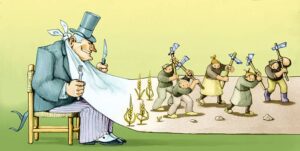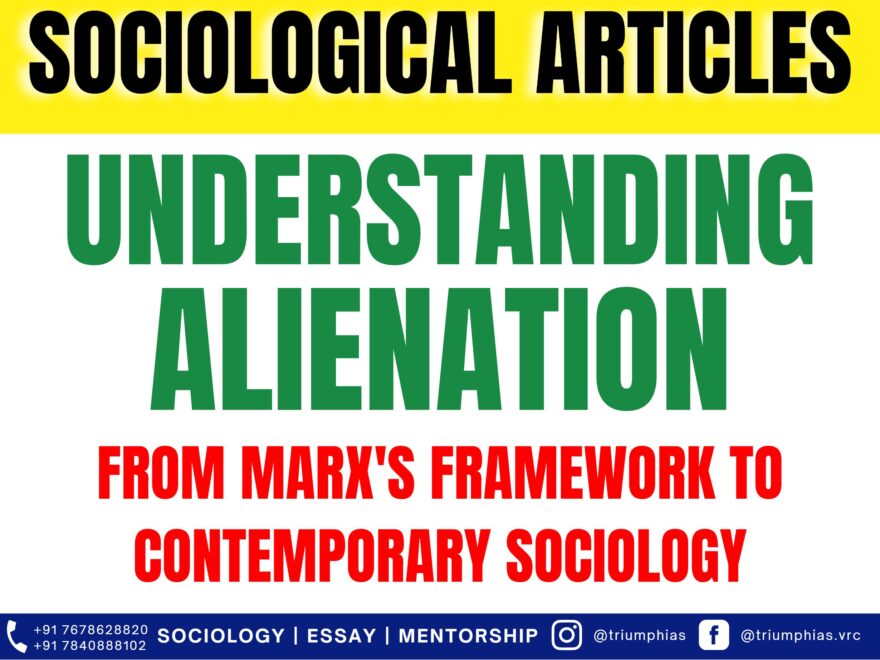Alienation
(Relevant for Sociology Optional Mains (Paper 1 Unit 4))

Marx has conceptualized alienation as a phenomenon intrinsic to societies where the worker is disconnected from the means of production and where “dead labour” (capital) exerts dominance over “living labour” (the worker). Alienation, in its literal sense, denotes a state of separation. However, Marx imbues it with a sociological significance. Let us consider the case of a shoemaker in a factory. The shoemaker crafts shoes but cannot utilize them for personal use. Consequently, their creation becomes an object detached from the individual. It transforms into a distinct entity separated from its creator. The shoemaker engages in shoemaking not solely to fulfill an inherent desire for work and creativity but rather to earn a livelihood. For the worker, this process of “objectification” is heightened within a factory setting where production is divided into numerous segments, and their role may be reduced to a minuscule fraction of the whole. As a result, their work becomes mechanized, devoid of creativity, and their sense of individuality diminishes
Given his borrowing from Hegel, it is not surprising that Marx’s criticism of his contemporary society was initially cast in terms of one of Hegel’s key concepts, alienation.
Alienation signifies the profound detachment of individuals from their very essence, reflecting a state in which productive labor fails to embody the true expression of human potential, energy, imagination, and creativity. During the nineteenth century, Marx recognized the stark contrast between this ideal and the reality experienced by industrial workers in developing societies. Rather than being a fulfilling endeavor, work became, at best, a necessary burden undertaken solely for survival. For the vast majority, it proved to be an oppressive experience, marked by physical discomfort, mental dissatisfaction, and spiritual numbness.
Furthermore, alienation extended beyond individual suffering to encompass the entire population of industrial society. Human essence is not a possession of isolated individuals but belongs to the collective species, awaiting full realization through the development of human potential. However, within the fabric of industrial society, a stark division emerged between those who enjoyed physical comfort and intellectual stimulation, engaging in freely creative activities such as art and culture, and those relegated to near-subhuman conditions within the brutal factory system.
Another dimension of alienation arises from the distortion of reality, leading individuals to deny their own true nature. Through misperceptions, people underestimate their own abilities, failing to recognize that certain accomplishments are the direct result of their own human effort rather than some external influence. Religion serves as a prime example, wherein fatalistic beliefs that God determines one’s fate strip individuals of agency over their own destinies. Marx, an atheist influenced by Ludwig Feuerbach, dismisses the notion of God as a human invention designed to confuse and mislead, as well as an expression of unfulfilled human desires. Embracing the idea of a higher power and subscribing to fatalistic views, individuals relinquish their capacity to shape their own future, erroneously perceiving themselves as subservient to supernatural forces beyond their control. In reality, no mystical beings or forces exist, placing the realm of human potentiality entirely within the realm of collective human agency.
Similarly, Hegel’s philosophy exemplifies a form of alienation, as the human spirit, composed of ideas, assumes an almost mystical existence of its own. This enigmatic, superhuman force manipulates history from behind the scenes, utilizing unwitting individuals as mere pawns to carry out its designs. However, it is human beings who generate ideas, including the concept of the “human spirit,” and not the reverse. Furthermore, it is human beings, not quasi-supernatural ideas, who shape history. Hence, actions conducted “behind people’s backs” are actually executed by other individuals, not by abstract ideas.
In Marx’s framework, another crucial form of alienation lies in individuals’ acceptance of their economic circumstances, whether it be unemployment or poorly paid labor, under the presumption that their fate is determined by economic laws beyond their control. The prevailing belief in many governments that the market possesses near-infallible wisdom, surpassing that of individuals or their governing bodies, reflects the enduring grip of this conception. Marx, however, rejects the notion that the market is a superhuman, all-wise entity, recognizing it as a human-created system of relationships, albeit unintentionally, which humans potentially have the power to control. He argues against resigning oneself to a wretched fate dictated by the nature of things, asserting that human beings shape themselves through their labor, develop their own nature by transforming the world around them, and possess the collective capacity to reshape themselves by transforming their physical, economic, and social reality.
Alienation manifests itself in four ways:
- The worker experiences profound alienation on multiple fronts within the capitalist system. Firstly, the worker is stripped of ownership and control over the fruits of their labor, as everything they produce is appropriated by the capitalist, leaving them powerless in determining the destiny of their own work.
- Secondly, the worker is severed from the very act of production itself, as all decisions pertaining to the organization of production are dictated by the capitalist. The intrinsic satisfaction that labor should naturally offer is replaced by a mere means of survival, devoid of any inherent value. Labor becomes an external compulsion rather than an end in itself, reduced to a mere commodity to be sold for the worker’s sustenance.
- This alienation extends to the worker’s essential human nature, or their species-being. Human beings are distinguished from animals by their unique creative ability to engage in labor. However, the aforementioned forms of alienation erode this distinctively human quality, separating individuals from their true essence and robbing them of their species-being.
- The prevalence of religion and the belief in an independent divine power can be attributed to this self-estrangement of humanity. As Marx famously noted, “The more man puts into God, the less he retains of himself.” The capitalist system exacerbates this process, stratifying individuals, destroying their inherent human qualities, and reducing them to a state worse off than animals. Unlike animals, which do not have to toil for survival under the command of others, human beings are subjected to such conditions within the capitalist framework.
- Furthermore, the worker experiences social alienation within the capitalist system, as social relations become market relations, wherein an individual’s worth is judged solely by their position in the market rather than their intrinsic human qualities. Capital accumulation engenders its own norms, degrading individuals to the status of commodities. Workers are reduced to mere factors in the pursuit of capital, with their activities dictated by the demands of profitability rather than their fundamental human needs.
- Marx fervently believed that liberation from the state of alienation is only achievable through the establishment of a communist society, wherein individuals would work to affirm their true selves instead of engaging in self-destructive labor. Since Marx’s time, the concept of ‘alienation‘ has evolved and gained significance in mainstream sociology, particularly in the writings of American sociologists in the 1950s and 1960s.
- However, Max Weber held a divergent view from Marx, asserting that alienation is an inevitable characteristic of modern industrial society, regardless of whether the means of production are privately or collectively owned. Weber attributed alienation to the rationalization of social life and the dominance of bureaucratic organizations in industrial societies. The relentless adherence to impersonal rules within bureaucratic structures reduces individuals to mere cogs in vast machines, eroding their human qualities. In the post-World War II era, American sociologists further adapted the meaning of alienation to align with the realities of advanced industrial societies.
- W. Mills observed that the growth of the service sector in modern industrial societies has contributed to self-alienation among white-collar workers. In these societies, the focus has shifted from ‘skills with things’ to ‘skills with persons,’ which non-manual workers are compelled to sell as commodities. Mills referred to this phenomenon as the ‘personality market,’ where aspects of one’s personality at work are artificial and insincere. He illustrated this with the example of a salesgirl in a department store, who, in the course of her work, becomes alienated from her true self as her personality serves as a tool for an external purpose. At work, she cannot be her authentic self.
- Herbert Marcuse delved into the relationship between work and leisure in advanced industrial societies, asserting that both activities estrange individuals from their genuine selves. Work is described as ‘stupefying’ and ‘exhausting,’ while leisure offers modes of relaxation that merely perpetuate and soothe this state of stupefaction, ultimately catering to false needs.
- Melvin Seeman approached the study of alienation through the Reputational Approach. He formulated a comprehensive definition of alienation, which he divided into five distinct elements: powerlessness, meaninglessness, normlessness, isolation, and self-estrangement. However, Seeman considered these elements as subjective dispositions that could be quantified using attitude scales.
- Robert Blaumer expanded on four of Seeman’s conditions and correlated them with different types of technology. According to Blaumer, jobs with lower technical complexity exhibit lower levels of alienation. He noted that handicrafts and cottage industries display less alienation compared to mechanized industries. Blaumer depicted the relationship between technology and alienation as an inverted U-curve. Craft industries, like printing, showed lower levels of alienation, whereas assembly-line industries associated with mass production, such as the automobile industry, exhibited higher levels of alienation. However, in process industries characterized by a high degree of automation, alienation tended to decrease as workers felt more engaged and responsible.
- In conclusion, the contemporary understanding of alienation has shifted from objective conditions to subjective dispositions, as evidenced by the evolving interpretations discussed above.
CONCLUSION
- Karl Marx’s concept of alienation provides a simplistic explanation for a complex set of phenomena. Various studies have shown that not all individuals necessarily experience alienation in similar working conditions. In the modern capitalist context, where human resources are highly valued, industries and authorities take measures to enhance the morale and efficiency of workers. Additionally, democratic societies have recognized the importance of trade unions, labor laws, and arbitration councils to safeguard the interests of workers, thereby reducing the likelihood of alienation. The advent of globalization and the growth of the service sector have also diminished the chances of alienation, as there is a greater emphasis on work culture and professionalism. Workers now have a stake in the companies they work for, becoming not just producers but also shareholders. Instead of being alienated, they are involved in company management, which fosters motivation and dedication. Furthermore, workers are provided with medical and educational benefits for their children.
- However, despite these changes, the exploitation and alienation of the working class persist in the evolving landscape. Recent strikes by workers in numerous industries serve as vivid examples of this ongoing issue. Thus, it would be premature to outrightly dismiss the Marxist concept of alienation. While the nature of alienation may have transformed, its existence continues to be a reality.
To master these intricacies and fare well in the Sociology Optional Syllabus, aspiring sociologists might benefit from guidance by the Best Sociology Optional Teacher and participation in the Best Sociology Optional Coaching. These avenues provide comprehensive assistance, ensuring a solid understanding of sociology’s diverse methodologies and techniques.
Alienation, Karl Marx, Sociology, Industrial Society, Modern Sociology, Marx’s Alienation, Contemporary Sociology, Industrial Alienation, Self-Estrangement, Worker Alienation, Marxist Theory, Best Sociology Optional Teacher, Best Sociology Optional Coaching, Sociology Optional Syllabus

